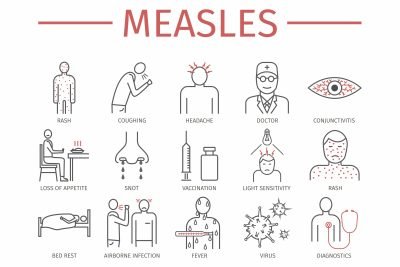Overview:
- Large outbreaks of measles have happened in Washington State, due to fewer people being vaccinated against measles
- Measles is not only a childhood disease. Adults can also get measles
- Complications from measles are dangerous and can lead to long-term illness, disability and even death
- Families need to know about measles complications and that vaccines protect not only their family but other people.
Full Article:
Prior to the COVID 19 outbreak in 2019, Washington State experienced several large outbreaks of measles. Why is that an issue? Measles is a virus that is preventable through immunization (getting a vaccine) and was almost completely eliminated in the United States by 2000. This changed when a social movement popularized the idea that immunizations were not needed and that requiring them restricted people’s choices. Because measles and other viruses had been mostly eliminated, younger families were not aware of the medical risks of so-called “childhood” illnesses, especially on the adults in their lives.
Measles is highly contagious, even more so than COVID, and can quickly sweep through a school or a community space such as a daycare center, a church, or at a social event. Unvaccinated people at these places or events have a high chance of getting measles. Why is this a problem? While the majority of individuals recover from measles with little to no health impact, complications may cause severe long-term illness, disability, and even death. Some of those conditions include hearing loss, encephalitis (which is fluid pockets and pressure build up on the brain), and pneumonia. If you have a child or family member who is already at high risk for virus or disease, the fact that viruses like measles, mumps, and whooping cough are on the rise again can be very concerning.
The COVID shutdown disrupted a lot of things and one of these was routine childhood wellness checks and immunizations. Some families have not caught up on what was missed during the shutdown. For some other families, the push back against COVID vaccinations extended to other vaccinations and their children are not vaccinated against viruses like measles.
Measles vaccinations typically are done with the first dose at 12 to 15 months and the second between ages 4 and 6. If your child or family members have not been fully vaccinated it is easy to request vaccination. Most clinics have it on hand and it is covered through most insurance plans, even for adults because of the potential health impacts. If you are an adult and have a question about coverage, call your insurer to check. If you are on Medicare, Part D covers this vaccine. If you have a Medicare Advantage plan which includes drug coverage, it’s a good idea to check with your insurer on coverage. This can be one way to stay ahead of the game by keeping yourself and those around you healthy and strong.
The Washington State Department of Health has a link to the CDC’s easy-to-understand chart of immunizations by age in well baby or child checkups, with a list of diseases preventable by vaccines. If your family does not have access to well child care or you are new to the United States, Community Health Centers, your county Department of Health, or even pharmacies where you can get flu and COVID shots can let you know where you can go to ask about getting up to date on measles and other vaccinations.

